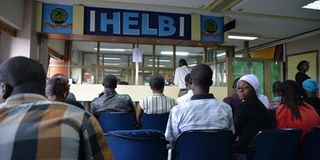Resolve student loans disbursement crisis

HELB has been a lifeline for many students who rely on the loans to pay for their education expenses, including tuition fees, accommodation, and other basic expenses.
The Higher Education Loans Board (HELB) is a critical government institution that provides financial assistance to thousands of students pursuing higher education in Kenya.
HELB has been a lifeline for many students who rely on the loans to pay for their education expenses, including tuition fees, accommodation, and other basic expenses.
However, the recent disbursement of HELB funds has left many students in distress, with over 140,000 missing out on the loans. This is a cause for concern, especially considering that many students rely solely on HELB funds to pay for their education expenses.
The government should take urgent action to address the situation and ensure that no student is left behind.
One of the key reasons why the government should act is that education is a fundamental right for every Kenyan citizen. Access to education should not be limited by financial constraints as this could hinder the country's development. The government has a responsibility to ensure that every student has equal access to education, regardless of their financial background.
Additionally, the government should acknowledge the vital role that HELB plays in supporting students' education. The loans have been a crucial source of funding for many students, particularly those from low-income families.
The funds help students to cover their tuition fees, buy books, pay rent, and meet other basic needs. Without HELB loans, many students would be unable to pursue higher education, thus limiting their future prospects.
Moreover, the government should act swiftly to address the issue of missed HELB disbursements. The delay in disbursing the funds has caused financial strain on many students.
The delay has also caused anxiety and uncertainty among students who are unsure whether they will receive the loans or not. This situation could lead to a drop in enrollment in institutions of higher learning, further affecting the country's development.
In conclusion, the government should take urgent action to address the issue of missed HELB disbursements. The loans are critical in supporting students' education and ensuring that every Kenyan citizen has equal access to education.
The government should allocate adequate resources to the HELB to ensure timely disbursement of funds and to cater to the growing demand for the loans. Additionally, the government should explore other avenues of financing education to complement the HELB loans and ensure that every student can access higher education.
Charlene Angela Awuor, Kisumu




